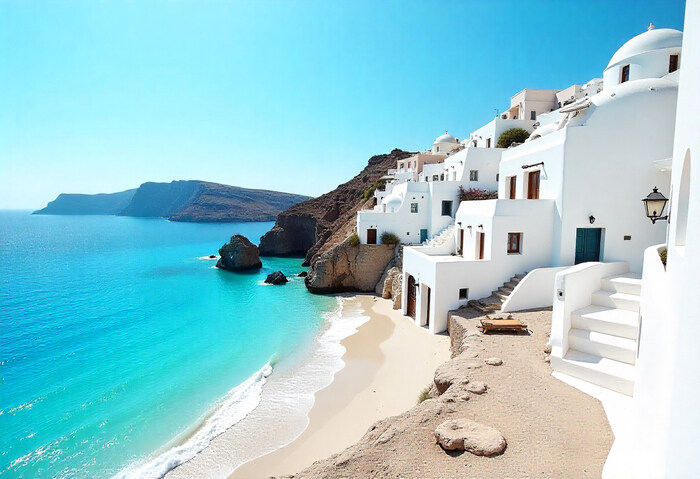Published on
October 5, 2025
Greece, Japan, Paris, Australia, Puerto Rico, Germany, Iceland, Antarctica and Vietnam have emerged as the most sought-after travel destinations for American travelers, highlighting a post-pandemic shift toward adventure, wellness, and cultural discovery. Americans are increasingly drawn to locations that combine breathtaking scenery, iconic landmarks, and life-enriching experiences. Greece enchants with its sun-drenched islands and ancient ruins, Japan fascinates with its seamless blend of tradition and modernity, and Paris continues to captivate with its unparalleled culture and cuisine. Australia offers vast landscapes and wildlife adventures, Puerto Rico combines tropical charm with rich heritage, Germany impresses with historic cities and vibrant festivals, Iceland mesmerizes with dramatic natural scenery, Antarctica appeals to those seeking once-in-a-lifetime polar adventures, and Vietnam delights with its lively streets and stunning landscapes.
This surge in interest reflects a growing desire among Americans for travel experiences that go far beyond relaxation. Immersive, bucket-list journeys that promote well-being, spark adventure, and create lasting memories are now in high demand. Influences such as social media inspiration, the rise of “revenge travel,” and a focus on personal fulfillment are driving these destinations to the top of U.S. travelers’ lists. From serene beaches to cultural explorations, wildlife encounters to wellness retreats, these nine countries collectively illustrate the evolving aspirations of American explorers seeking meaningful and transformative travel experiences.
The COVID-19 pandemic reshaped the way people view travel, triggering a wave of “revenge travel” as Americans seek to make up for lost opportunities during lockdowns and restricted mobility. This trend has spurred a renewed focus on carefully curated travel experiences, with many travelers now selecting trips based on personal fulfillment rather than convenience or routine. However, the study also highlights a psychological challenge facing many travelers. Nearly seven in ten Americans (69 percent) report feeling they are falling behind on their travel goals, particularly when comparing themselves to the experiences of friends, family, or social media peers — a phenomenon experts are calling “travel dysmorphia.”
Despite these pressures, American travelers remain ambitious in their travel dreams. Greece ranked third among aspirational destinations, with 19 percent of survey respondents citing it as a top choice. Japan and Paris tied for the top spot at 24 percent each, while Australia (17 percent), Puerto Rico (16 percent), Germany (14 percent), Iceland (12 percent), and both Antarctica and Vietnam (5 percent) rounded out the list of popular destinations. Greece’s enduring appeal lies in its combination of rich historical heritage, scenic landscapes, vibrant local culture, and iconic islands that offer both relaxation and adventure.
Travel as a Vital Component of Well-Being
The survey also sheds light on the deeper motivations behind travel, with 72 percent of participants acknowledging the positive impact of travel on their emotional and mental well-being. For many, trips are not just a leisure activity but a vital means of personal growth, stress relief, and cultural enrichment. Travel provides an opportunity to step away from everyday responsibilities, reconnect with loved ones, and engage in experiences that foster a sense of accomplishment and joy.
At the same time, the survey highlights common obstacles that prevent Americans from fully realizing their travel ambitions. Time constraints, the complexities of planning, and financial considerations frequently limit travelers’ ability to pursue their ideal trips. These challenges suggest that while the desire to travel is strong, practical barriers often temper aspirations.
Emerging Trends in Travel Preferences
Looking ahead, Americans are showing a clear preference for a variety of vacation styles. Beach getaways remain the most popular choice, with 37 percent of respondents indicating a desire for sun-soaked destinations where relaxation and leisure take center stage. Cruising also continues to attract interest, with 28 percent favoring ocean cruises, 18 percent river cruises, and 6 percent opting for polar expeditions. All-inclusive resorts appeal to 24 percent of travelers, offering convenience and a comprehensive travel experience.
Experiential travel is another growing trend, with Americans increasingly seeking journeys that provide more than just sightseeing. Wildlife-focused trips appeal to 22 percent of respondents, while wellness retreats (13 percent) and culinary experiences (12 percent) are gaining traction among those who want travel to be transformative and immersive. This shift reflects a broader movement in the travel industry toward personalized, experience-driven itineraries that allow travelers to engage deeply with their destinations.
The study, conducted between June 6 and 13, 2025, surveyed 2,000 Americans across different age groups, including Gen Z, millennials, Gen X, and baby boomers. This demographic diversity provides a comprehensive view of contemporary travel trends in the United States, highlighting both the aspirations and constraints shaping American travel behavior today.
Conclusion
Greece, Japan, Paris, Australia, Puerto Rico, Germany, Iceland, Antarctica and Vietnam lead U.S. aspirational travel as Americans seek bucket-list adventures, cultural immersion, and wellness-focused, once-in-a-lifetime experiences. Their unique blend of iconic landmarks, scenic beauty, and transformative journeys makes them the top destinations on travelers’ dream lists.
The findings underscore that while Americans face challenges in fulfilling their travel dreams, their desire for meaningful and enriching experiences remains undiminished. Greece’s popularity reflects its unique ability to combine historical depth, natural beauty, and cultural richness, making it a destination that resonates with travelers seeking both inspiration and relaxation. As the post-pandemic travel landscape continues to evolve, destinations that offer authentic, immersive experiences and cater to personal aspirations are likely to remain at the forefront of American travelers’ imaginations.
